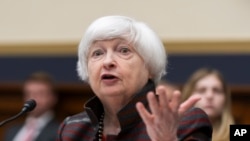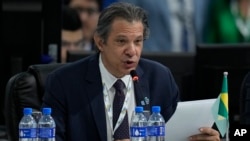A proposal under consideration by some members of the G20 group of advanced economies that would place a worldwide tax on the assets of the ultrawealthy does not have the support of the Biden administration, U.S. Treasury Secretary Janet Yellen said Monday.
Yellen told The Wall Street Journal that the United States is in favor of progressive taxation, under which the wealthy pay a larger share of their income than those of lesser means. However, she said, the “notion of some common global arrangement for taxing billionaires with proceeds redistributed in some way — we’re not supportive of a process to try to achieve that. That’s something we can’t sign on to.”
The plan will have limited chances of being implemented without U.S. support, even though it appears to have the backing of the leaders of some large economies such as France and Brazil.
The U.S. position on a global tax on billionaires is in contrast to its support of a global minimum tax on international businesses, for which Yellen helped broker an agreement early in President Joe Biden’s term in office.
2% tax would raise $250 billion
The object of a global tax on the wealth of billionaires would be to prevent the ultrawealthy from avoiding taxation by moving their money across borders or into tax havens that their home-country tax authorities cannot reach.
Taxing wealth instead of income, which is normally where levies are focused, would prevent billionaires from exploiting investment strategies that allow them to increase their wealth while generating little taxable income.
In remarks at the G20 finance ministers meeting in February, economist Gabriel Zucman, director of the EU Tax Observatory, cited evidence demonstrating that the current global taxation of billionaires is regressive, meaning that the effective tax rate they pay is lower — sometimes much lower — than the rates paid by average taxpayers.
“Although there is a lot that can be done by countries acting individually, the best way to address this regressivity is by creating a common minimum standard through international coordination,” Zucman said.
“This is because the main obstacle to taxing the very rich in practice is the risk that they may relocate to low-tax places. This international competition has exerted considerable pressure on the design of tax systems globally. But with international coordination, a binding floor can be put to the tax rates of the ultrawealthy.”
Zucman’s organization has estimated that a 2% annual tax applied to the wealth of approximately 3,000 billionaires worldwide would generate some $250 billion in revenue each year.
‘Moral debt’
Addressing a G20 meeting in Washington last month, MIT professor and Nobel Prize-winning economist Esther Duflo spoke in support of the 2% tax, as well as a global tax on international businesses, and argued that the proceeds should be directed toward assisting poor nations as they struggle to adapt to climate change.
“Rich people and rich corporations are making their income from selling their products everywhere in the world, including in poor countries,” Duflo said. “Their products also greatly contribute to climate change.”
She characterized wealthy nations’ obligation to help poor countries manage the climate transition as a “moral debt” and said demanding that the ultrawealthy pay more is only just.
“We are not talking about extortion,” she said. “We are talking about paying your fair share.”
Taxation a ‘key concern’
At the same meeting, Brazilian Finance Minister Fernando Haddad defended the focus on international taxation of the wealthy as essential to economic justice.
“International taxation is not merely the favorite theme of progressive economists; it is an issue of key concern that is at the heart of the global macroeconomic issue,” Haddad said.
“Inequality has been increasing, and the [United Nations] Sustainable Development Goals are becoming increasingly distant,” he said. “During Brazil's presidency of the G20, I have advocated for a new globalization based on social and environmental criteria.”
He added, “Each country can go a long way individually. ... However, without international cooperation, there is a limit for national states to act. Without cooperation, those who are on the top will continue to evade our tax systems.”
France, IMF also in favor
French Finance Minister Bruno Le Maire, at the same event, told Haddad, “You can count on France’s absolute support.”
“It is a matter of efficiency and justice,” Le Maire said. “The idea is that each one will pay with their fair share of contribution.”
Also in favor was International Monetary Fund Managing Director Kristalina Georgieva, who said, “In most countries, the rich pay fewer taxes than the middle class and even the poor. Our first choice is to close the loopholes and prevent tax evasion. We call on the international community to implement agreements that allow sharing of tax information.”












